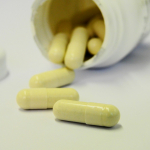In 2019, the Food and Drug Administration (FDA) approved brexanolone, marketed by Sage Therapeutics as Zulresso, as a treatment for postpartum depression (PPD). As a neurosteroid, brexanolone represents a novel approach to the treatment of postpartum mood disorders. One of the most exciting things about brexanolone is the rapidity of the response, with the initial studies indicating remission of depression within 24 to 48 hours. Because antidepressants typically take 2-4 weeks to kick in, an antidepressant agent with rapid onset of action would be particularly appealing to women with severe PPD.
One of the major disadvanges, however, is that Zulresso must be administered intravenously over 60 hours, which means that patients must be hospitalized for about three days. In addition, Zulresso may have potentially serious side effects, including excessive sedation and sudden loss of consciousness; thus the FDA requires a REMS (Risk Evaluation and Mitigation Strategy) for healthcare facilities seeking to administer Zulresso. According to the REMS, patients must be under 24-hour supervision with monitoring by an on-site medical professional. Given these constraints, the rollout of Zulresso has been slow.
But we may soon have access to another option for the treatment of PPD: zuranolone. Like brexanolone, zuranolone is a neurosteroid, an analogue of allopregnanolone which is a positive allosteric modulator of the GABA-A receptor. What distinguishes zuranolone from brexanolone is that it has much better oral bioavailability and thus does not have to be administered intravenously. It can be taken as an oral medication, similar to conventional antidepressants.
Results from the SKYLARK Study
Today Sage Therapeutics, Inc. and Biogen Inc. released data from the Phase 3 SKYLARK Study of zuranolone being evaluated in women with postpartum depression. The SKYLARK Study was a randomized, double-blind, placebo-controlled study evaluating the efficacy and safety of zuranolone 50 mg. Women with PPD (between the ages of 18 and 45) were eligible for the study if they were less than six months postpartum and had a major depressive episode beginning during the third trimester or before 4 weeks postpartum. This study included only women with severe PPD, defined as a baseline 17-item Hamilton Rating Scale for Depression (HAMD-17) score of 26 or higher. Participants (n=200) were randomized to receive either placebo or zuranolone (50 mg) administered orally each evening for 2 weeks. The study population included approximately 22% Black or African American women and 38% Hispanic or Latina women.
A total of 200 patients were randomized. By day 3, women receiving zuranolone experienced a greater reduction in HAM-D scores than women receiving placebo (mean reduction, 9.5 vs 6.1; P = 0.0008). The difference in mean HAM-D scores steadily increased up to day 15. At day 15, the mean reduction in HAM-D scores was 15.6 in women receiving zuranolone vs. 11.6 in the placebo group (difference -4.0; P = 0.0007).
At day 45, women treated with zuranolone continued to show a greater reduction in HAM-D scores than women receiving placebo (-17.9 vs -14.4, P = 0.0067).
Zuranolone 50 mg was generally well-tolerated; the majority of adverse events were mild to moderate in severity. The most common adverse events were somnolence, dizziness, sedation, headache, diarrhea, nausea, urinary tract infection and COVID-19. No evidence of withdrawal symptoms as assessed using the 20-item Physician Withdrawal Checklist.
There was no indication of an increase in suicidal ideation or suicidal behavior over baseline, as measured with the Columbia Suicide Severity Rating Scale (C-SSRS).
Looking Forward
The current study indicates that zuranolone has antidepressant effects in women with severe PPD. Improvements in depression were observed at day 3 and improvements perished over the 45 days of the study.
Adverse events were mild to moderate in severity. Because of concerns about serious adverse events in women receiving brexanolone (suicidal ideation after the infusion in one subject and syncope/altered consciousness in another patient), Zulresso was approved with a Risk Evaluation and Mitigation Strategy (REMS). It seems unlikely that zuranolone will require a REMS.
Sage Therapeutics and Biogen have initiated a submission of a New Drug Application (NDA) to the U.S. Food and Drug Administration for zuranolone in the treatment of major depressive diosrder and plan to complete the MDD NDA filing in the second half of 2022. A separate NDA filing for zuranolone as a treatment of PPD will be submitted in early 2023.
Ruta Nonacs, MD PhD








Leave A Comment